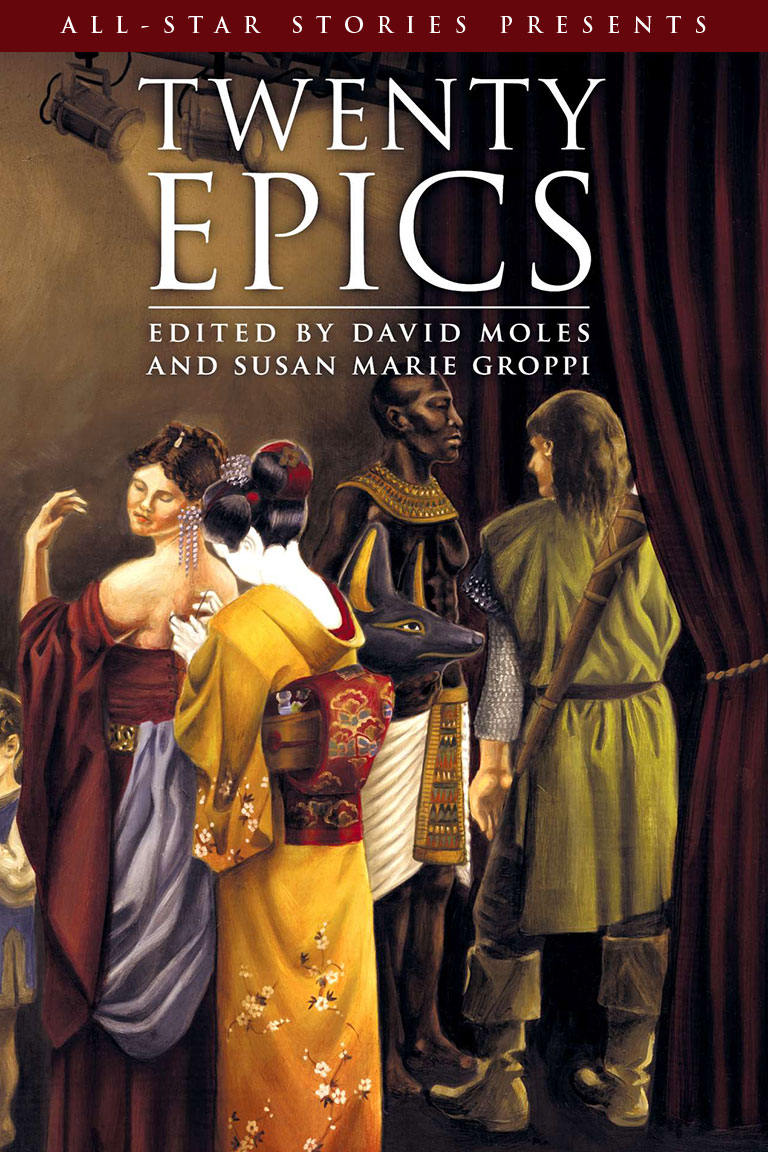
Design and illustration by Lara Kratz.
Twenty Epics
Edited by David Moles and Susan Marie Groppi
David Moles and Susan Marie Groppi, eds. Twenty Epics. Berkeley: All-Star Stories, 2006. ISBN 978-1-84728-066-4.We used to like epics. We used to invest untold hours in those big fat fantasy series, those brick-thick novels full of unpronounceable naming schemes, gender-segregated magic systems, color-coded conceptions of absolute good and absolute evil. But somewhere along the way, they lost their charm. When it takes ten or twenty years for a writer to finish a series, writing the same book over and over again, dragging on and on, piling up the foreshadowing, wearing out characters’ boots to no good purpose, writing stories that just don’t end—they rob the stories of any real passion or power or epic grandeur.
And that’s what it’s really about. It’s not about the pewter tankards, the saucy wenches, the rough woolen cloaks; it’s not about the vengeful gods, the cryptic wizards, the farm boys with inexplicably great destinies; it’s not about the magic rings and rune-swords and jeweled coronets, the greaves and pauldrons and destriers. It’s about grandeur.
There’s a place in our hearts that used to be stirred by tales of heroism and discovery, creation and destruction, sin and redemption and catastrophe, love and high adventure.
What does it take to reach that place?
It was a little taller than a man, and had the body of a man, though covered with a dark gray fur; but its head was the head of a jackal. It wore armor of bronze and leather, all straps and discs with curious engravings, and carried a great black spear with a vicious point at each end.
Marish had heard that there were all sorts of strange folk in the world, but he had never seen anything like this.
“May you die with great suffering,” the creature said in what seemed to be a calm, friendly tone.
“May you die as soon as may be!” Marish cried, not liking to be threatened.
The creature nodded solemnly. “I am Kadath-Naan of the Empty City,” it announced. “I wonder if I might ask your assistance in a small matter.”
Marish didn’t know what to say to this. The creature waited.
Marish said, “You can ask.”
“I must speak with . . .” It frowned. “I am not sure how to put this. I do not wish to offend.”
“Then why,” Marish asked before he could stop himself, “did you menace me on a painful death?”
“Menace?” the creature said. “I only greeted you.”
“You said, ‘May you die with great suffering.’ That like to be a threat or a curse, and I truly don’t thank you for it.”
The creature frowned. “No, it is a blessing. Or it is from a blessing: ‘May you die with great suffering, and come to know holy dread and divine terror, stripping away your vain thoughts and fancies until you are fit to meet the Bone-White Fathers face to face; and may you be buried in honor and your name sung until it is forgotten.’ That is the whole passage.”
“Oh,” said Marish. “Well, that sound a bit better, I reckon.”
Benjamin Rosenbaum, “A Siege of Cranes”